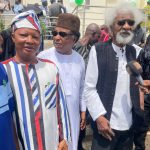By Stephen Salawu
Governor Ahmed Usman Ododo, the Executive Governor of Kogi State is a remarkable individual, born in a farmstead, who has risen from a humble village boy to a respected political leader. His journey is a testament to the power of hard work, determination, and passion for making a difference.
For upwards of 55 minutes, I was glued to the TVC channel listening to this young man from an obscure Upogoro village of Okene Local Government Area in Kogi State, speaking on diverse issues.
From that encounter with Babajide Kolade Otitoju, one is able to explore Ododo’s inspiring story and the lessons we can learn from his transformation.
Fondly described as the ‘Flower Boy’, young Sumonu, as his parents usually called him, I wonder why they didn’t name him ‘Ohiaré, to depict his birth in a farm, and raised in a small hilly village, Upogoro, where he faced numerous challenges, including poverty and limited access to education.
Despite these obstacles, he was determined to succeed and worked hard to excel in school. His parents, instilled in him the value of education and encouraged him to pursue his dreams. That was all he needed to conquer ignorance that comes with illiteracy.
Ododo’s leadership journey began in his village, Upogoro, as he worked tirelessly for his community before venturing into politics with charisma and vision that has earned him recognition, having caught the attention of local politicians, who mentored him and helped him to navigate the political landscape and soon became a respected leader among his peers.
Ododo’s political career is such that he championed the causes of his community right from his day one in the administration of Ex- Governor Yahaya Bello, as a Chartered Forensic Accountant, fighting for improved infrastructure, healthcare, and education. His dedication and integrity earned him widespread recognition, and he soon became a sought-after leader.
Life in a farm homestead, refered to as ‘Udi’, can be very rewarding and fulfilling. Some aspects of life on a farm homestead, includes, but not limited to, close connection with nature and the outdoors, opportunity to grow and raise your own food towards self-sufficiency and independence. It comes with stronger family bonds and community ties with opportunity to learn new skills and traditions.
These pros in the farmstead have its cons, which involves hard physical labour and long hours of isolation and limited access to amenities like access to healthcare and education, potential for financial struggles, laced with high level of responsibility and stress.
Overall, life in a farm homestead requires a strong work ethic, resilience, and a deep connection with the natural world. That’s the semblance of the daily life of young Ododo on his family’s farm homestead.
Today, history has been kind to him and given him the opportunity, as the Executive Governor of Kogi State, to change the narratives of his yester-years through his Agricultural Programmes in the largely agrarian state.
Governor Ahmed Usman Ododo was born right in the middle of a farmstead which probably influenced his aims to make Kogi State an agricultural hub in Nigeria, focusing on food security and development. Specific targets have been set, including 1,200 hectares for cassava, 5,124 hectares for rice, and 1,200 hectares for maize, for farmland cultivation, with all Local Government Areas actively participating in the program.
The government has invested over N7 billion in farm implements to ensure food security and has presented over 100 tractors to serve about 10,000 farmers in different farming communities across the 21 LGAs in the state.
Ododo plans to develop Agro Industrial Hubs (AIHs) and Agro Transformation Centres (ATCs). AIHs and ATCs to achieve food security and agricultural growth.
The Governor has initiated a program to provide free tractors to farmers, promoting massive food production and food sufficiency. Ododo launched the wet season farming initiative with an investment of over 7 billion naira in farm inputs and equipment.
The Governor has ensured that environmental and social impact assessments are conducted for agricultural projects, prioritizing sustainability and community engagement.
Ododo emphasizes the importance of improved Welfare for Workers. The Governor promised and has reviewed and improved the welfare of workers, through prompt payment of salaries, while acknowledging the role of agricultural activities in the state’s development.
The state government has initiated an Agricultural Intervention Programme aimed at addressing food scarcity by focusing on rice, maize, and cassava production.
Similarly, the state government, supported by the World Bank, is establishing a state-of-the-art Livestock Service Centre (LSC) within Confluence University of Science and Technology, Osara, to enhance livestock productivity commercialization and resilience in Kogi State.
On his initiative on Wet Season Farming, the government has invested in the procurement and refurbishing of tractors, fertilizers, herbicides, rice seedlings, maize seedlings, and cassava cuttings to support farmers during the wet season farming initiative. This is with a view towards increased food security with its numerous advantages, including reduced hunger and malnutrition, improved health, increased productivity, economic stability, and growth.
Ododo’s food security strategies will lead to reduced poverty by ensuring access to staple affordable food, poverty rates can decrease by reducing the risk of food shortages, improved children nutrition and education towards improved cognitive abilities and reduced mortality rates among children and vulnerable populations.
By achieving food security, there’ll be increased political stability, overall improvement in quality of life, communities can thus, break the cycle of poverty, improved health outcomes, and create a more stable and prosperous future.
Governor Ahmed Usman Ododo’s recent appearance on Journalist Hangout on TVC with Babajide Kolade Otitoju, portrayed him as the people’s Chief Servant and an avowed committed farmer, while committing himself to workers’ welfare, security, and building on the structures laid by his predecessor, GYB.
He displayed sincerity of purpose and dedication to the people of Kogi State during the interview. He praised President Bola Ahmed Tinubu’s outstanding leadership and support for Kogi State and Nigeria at large.
His laid much emphasis on reviving agriculture, cutting costs of governance, tremendous improvement in the Kogia State IGR and leveraging on Kogi’s strategic location, sharing borders with 9 states as the gateway to the FCT and connecting the north and the south.
Governor Ahmed Usman Ododo’s TVC interview was a compelling display of leadership, vision, and sincerity to build Kogi State of our dreams.
Ododo’s story teaches us valuable lessons about humility and governance. Despite facing numerous challenges, Ododo remained committed to his goals through perseverance and with love for his community with the desire to make a difference that propelled him to succeed.
His willingness to learn from others through mentorship of his predecessor, coupled with unwavering commitment to his values, earned him respect and trust that’s helping him navigate the political landscape.
Governor Ododo’s transformation from a village boy to a political leader is a testament to the human spirit’s potential. His story inspires us to pursue our dreams, regardless of our background or circumstances.
As Ododo continues to lead and serve Kogi State, his legacy will undoubtedly inspire future generations of leaders.
From a village square discussion, somebody captured him as, ‘this Oga in Lugard House get beta plans for Kogi ooo, hin dey try. Ólakóló, Éku’ishé, Akóró Nda.’
**Steve Salawu is a Multimedia Practitioner*






